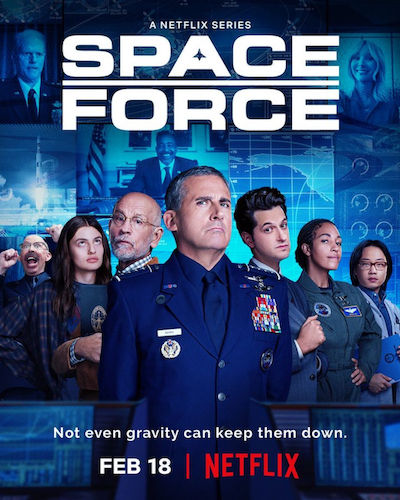Space Force
Created by Steve Carell and Jeff Daniels
Release Date (Streaming): May, 2020 (Netflix)
Space Force is an outer-space/military comedy that debuted in 2020 on Netflix (the second season was just released this February). It depicts the exploits of four-star Air Force General Mark Naird, played by Steve Carell, and his team of scientists and “spacemen” (as the members of the new military branch are humorously known—though some, like the laid-back yet heroic Captain Angela Ali, resist the embarrassing moniker) as they stand up the nascent Space Force. As the Secretary of Defense explains to General Naird, the President wants “space dominance and boobs on the moon,” a garbled directive, the Secretary hastens to add, which he believes is a misspelled tweet, the intended word probably being “boots” (the President, never seen, is a thinly-veiled representation of former President Donald Trump). At the heart of the comedy is a serious question: Does outer space represent a fresh start for humankind, or is it merely an expansion of the power conflicts between nations on earth into a new realm?
The first season struggled to find a focus, veering between political satire, the rivalry between Naird and Air Force General Kick Grabaston, Naird’s family issues, and the clash between Space Force scientists and military members over the colonization of space. This last topic is the most compelling. The two main protagonists, General Naird and his chief scientist, Dr. Adrian Mallory, played with eccentric flair by John Malkovich, have a relationship reminiscent of that between General Leslie Groves, Jr. and Dr. Robert Oppenheimer during World War II as they ran the Manhattan Project. The Manhattan Project, which created the atomic bomb, was a double-edged sword: It ushered in the atomic age and the rise of the U.S. as a major world power, but it also created a weapon that unleashed unprecedented death and destruction, the shadow of which hangs over today’s world. The conquest of space offers a similar dilemma. The fussy, arrogant Mallory, who believes that “space should be a place of wonder, not of conflict and death,” clashes with the straight-laced, concrete-minded Naird, a fighter pilot and Bosnian war veteran, who believes in taking action to achieve a mission regardless of risks, an attitude that sometimes leads to conflict with his more cautious scientists.
Naird is fundamentally a decent, principled man under tremendous pressure from his superiors to achieve results. His blunt, authoritarian approach, honed by years in the military, ill equips him for coping with a new world order. His obnoxious millennial social-media expert, who everyone refers to as “Fucktony” (instead of his preferred handle of “F. Tony”) insists on documenting every Space Force event in hipster tweets and bemoans the fact that he’s saddled with Naird as his boss, “a Boomer who doesn’t know how to talk to women.” It’s true that Naird is often out of step with his team and even with the times, operating within a world that’s more cosmopolitan and complex than he understands. Attempting to root out a spy in one episode, he displays a suspicious media file from Mallory’s work computer on the mission-control screen in front of the staff, only to discover that it’s a clip of Mallory serenading his boyfriend on the piano. In another episode, when Naird exhorts his team to save a disabled satellite on the grounds that “we’re all Americans,” he’s corrected by members who remind him that many of them are from other countries or hold green cards. Naird, hoping to salvage Dr. Mallory’s psychological experiment on space colony group dynamics, insists on volunteering to replace a test subject who has dropped out. However, due to his profound awkwardness and overestimation of his own abilities, Naird antagonizes the remaining colonists, causing a junior scientist to quip that they have formed “a triangle of spite against him.”
In spite of it all, Mallory comes to realize that they’re on the same side, and he and Naird form an affectionate friendship. During a hostile Congressional hearing, Mallory comes to Naird’s aid after hearing his impassioned justification for spending exorbitant amounts of money to provide fresh fruit to astronauts. Later, in talking about a project which uses satellites to enhance early warning of hurricanes, Mallory concedes that without the military’s protection against enemy satellites his work could be endangered. A cerebral gay man who has contended with plenty of bullies in his time, Mallory lets Naird in on his secret weapon: “Passive aggression is the weapon of the powerless,” he says. He uses this secret weapon to great effect when he introduces malicious computer code to disable the exoskeletal suits worn by rival Air Force opponents during mock combat, allowing Space Force members to triumph. Never mind that the mock combat consists of rival teams attacking each other with pump-action BB guns and cuticle scissors to pop balloons on the bodies of combatants (the balloons representing space suits, a popped balloon signifying the breech of a suit and lethal depressurization). Victory is important to Naird and to Space Force, and Mallory comes to the rescue.
The climax of the season is the moon voyage. Captain Ali, now a mission commander, agonizes over what she will say when she first steps foot on the moon, realizing that she will be the first Black woman to do so. Her planned quote, “It’s good to be back on the moon,” comes out as, “It’s good to be Black on the moon,” making her a social media sensation. But the situation takes a serious turn when the astronauts discover that the Chinese already have a moon base established and don’t appreciate having neighbors. They’re secretly mining the moon for energy under the guise of conducting research. Things escalate quickly. In an instance of role reversal, Mallory, angry over his conciliatory overtures being rebuffed by the head scientist of the Chinese base, lambasts Naird for not being more assertive. The Chinese destroy the Apollo 11 flag, prompting the Secretary of Defense to order that the Chinese base be destroyed. Unbeknownst to Mallory, Naird previously placed a cache of weapons onboard the U.S. spacecraft, which can be used to carry out the order. When Mallory discovers the subterfuge, he quits in a rage. However, he reconsiders when a conscience-stricken Naird asks for his help. Mallory instructs Naird on a passive-aggressive approach to thwart the order: Have the astronauts cannibalize their weapons to make components needed to set up their station. The SecDef then orders the astronauts to attack with whatever makeshift weapons they have on hand (crescent wrenches). They do so, but upon their return to their base discover that the Chinese have done the same thing to them, marooning both groups without oxygen or hope of survival, ending the first season on a cliff hanger.
In the last episode of the first season, Naird muses that the Greatest Generation, those who lived through World War II, generally made good decisions afterwards because they remembered the horrors of war. When the past is forgotten, he concludes, its mistakes are repeated. The real-life Space Force, which also debuted in 2020, faces a struggle similar to that of its fictional counterpart: To forge a new identify and also address concerns about the future of conflict in outer space. If their project is successful, then it truly could be good to be back on the moon.
Deb Carr
Deb is a 2019 Fairfield University MFA graduate. She also has a B.A. in English from the University of Maryland. However, that was a while back and she spent her time doing everything except English, acquiring a D.V.M. and a Masters of Public Health along with the way. She spent over ten years in the Air Force as a Public Health Officer, traveling to such exotic locations as South Korea, Germany, Iraq, Hawaii, and Texas. Her MFA thesis was a screenplay, Ojibway Lake, a psychological thriller. She hasn’t had any fiction published yet, although she’s had non-fiction science articles published in an on-line British publication focused on chemical and biological warfare, writing about topics ranging from animal diseases to COVID-19.








